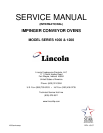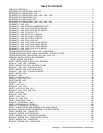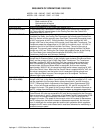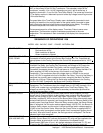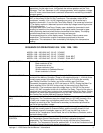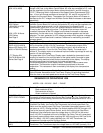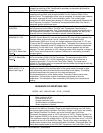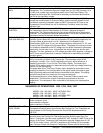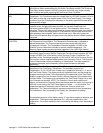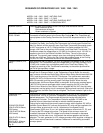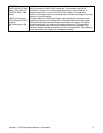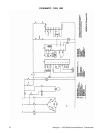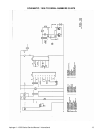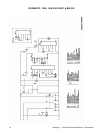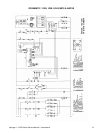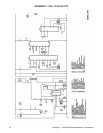
Impinger I -–1000 Series Service Manual - International 8
Fan, and the Heat and Conveyor Switches.
TRANSFORMER (12.6
VAC)
Upon closure of the Fan Switch, 120 VAC is supplied to the primary of the 12.6 VAC
Transformer. The Transformer steps the voltage down to 12.6 VAC (normally 13 to
14 VAC) with a center tap, and supplies power to the Time/Temp Display. The
voltage from each leg of the Transformer's secondary to the center tap should be
one half of the secondary voltage.
HEAT CIRCUIT Closing the Fan Switch and the normally open Heat Switch supplies 120 VAC
through the normally open Air Pressure Switch, and the normally closed Hi-Limit
Thermostat (manually re-settable, opens at 368°C) through the 3A Fuse, to the
Temperature Control Board, the coil of the Mercury Contactor, and to the Heat
Indicator Light.
TEMPERATURE
CONTROL
When the Heat Switch is closed, 120 VAC is supplied to the Temperature Control.
The Temperature Control Potentiometer (2.5K ohm) is adjusted to desired
temperature. The Thermocouple will provide varying millivolts to the Temperature
Controller. The Temperature Controller switches the L2 line of the Contactor coil at
intermittent intervals to maintain desired temperature.
CONVEYOR DRIVE
(S/N 4390 AND UP)
Closing the fan switch and the normally open conveyor switch supplies 120 VAC to
the Motor Control Board AC volts are converted to DC volts and are supplied to the
Conveyor Motor at terminals A+ and A-. Adjustment of the Speed Control
Potentiometer (5,000 ohm 10 turn ) will change resistance at terminals P1, P2, and
P3 varying the DC voltage to the Conveyor Motor. The speed of the conveyor motor
will increase or decrease as the DC voltage from the board increases or decreases
respectively. As the motor turns, it drives both the reducer gear box and the tach.
generator. The tach. generator is a DC voltage generator which supplies a voltage to
the DC motor control board and is used as a reference for maintaining a constant
conveyor speed.
TIME TEMP DISPLAY The Time/Temp. Display is energized when the Fan Switch is closed, supplying 120
VAC to the primary of the12.6 volt Transformer. The secondary output of the
transformer, normally 13 to 14 VAC (depending on input), with a center tap, is
supplied to terminals 1,2, and 3 of the Time/Temp. Display. The center tap is
terminal 2.The display works on a balanced input and center tap voltage to each leg
must be 1/2 the total reading.
The speed side of the Time/Temp. Display uses a slotted disc (cemented to tach.
coupling) to break the infra-red light beam of the optical switch (mounted on gear
motor) producing electrical pulses that are transmitted to the display. The display
converts these pulses into a read-out of minutes and seconds.
The temperature portion of the display uses a Thermistor Probe to sense oven
temperature. The thermistor outputs a resistance proportional to the oven
temperature. This resistance is then converted by the display into a temperature
reading.
SEQUENCE OF OPERATIONS / 1033, 1034, 1046, 1047
MODEL 1033 / 220 VAC - 50HZ / NATURAL GAS
MODEL 1034 / 220 VAC - 50HZ / L.P. GAS
MODEL 1046 / 240 VAC - 50HZ / NATURAL GAS
MODEL 1047 / 240 VAC - 50HZ / L.P. GAS
POWER SUPPLY Electrical Power to be supplies to the oven by a three-conductor service.
Brown conductor is Hot
Blue conductor is Neutral
Green conductor is Ground
CONTROL BOX AUTO
COOL DOWN
When the temperature in the Control Box reaches 120°F± 3°, the Cooling Fan
Thermostat will switch power to the Control Box Cooling Fan. The Thermostat will
interrupt power to the Cooling Fan when the Control Box temperature falls to
100°F±3°.
MAIN FAN CIRCUIT Electrical power is permanently supplied to the normally open contacts of the oven
fan motor relay, the Cooling Fan Thermostat, and the normally open Oven Fan
Switch. Closing the oven fan switch supplies 220 VAC, through a 3 AMP Fuse, to the
primary of the Power Transformer (the transformer steps the voltage down to 120
VAC for the control circuit). 120 VAC is supplied to the Cooling Fan, the normally
open Conveyor Switch, the Electronic Temperature Control, and to the coil of the



